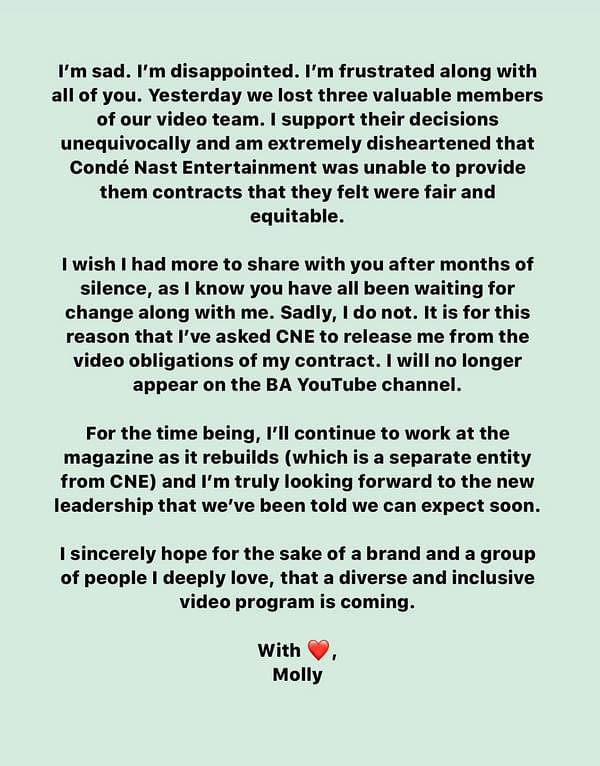Posted in: streaming, TV | Tagged: Andrew Rea, baking, Binging with Babish, bleeding cool, Bon Appetit, Brad Leone, cable, Claire Saffitz, cooking, Cooking Channel, Food Network, Molly Baz, Priya Krishna, Rick Martinez, Sohla El-Waylly, streaming, television, tv
Sohla Out: How Bon Appetit Shakeups Changed Cooking Shows Forever
When Binging With Babish's new episode premiered, it included two items of seismic importance. First, host Andrew Rea appeared with chef and writer Sohla El-Waylly from Bon Appetit. Second, both chefs mutually decided to remove their masks. Without context, these seem less momentous. But in many ways, they are the harbingers of major changes. First, that at least where they were filming in New York City, once the hottest of hot zones of America's COVID-19 outbreak, things were truly getting back to normal (enough) to do this safely. Second, Sohla has been at the epicenter of a giant shakeup at Bon Appétit and their popular channel, and Rea's invitation to appear alongside him is a show of solidarity and support in a scandal involving structural racism at one of the top cooking entertainment brands in the country.

Bon Appétit has had an eventful 2020. The venerable gourmet cooking and lifestyle magazine began the year with its video offerings among the most popular on the internet. Their YouTube channel and its multiple stars like Claire Saffitz, Mollie Baz, and Brad Leone had their own fanbases and were cornerstones of their content, as well as their own streaming channel available on Roku, Samsung TVs, and elsewhere.
As the pandemic overtook America, the channel only became more popular, people aching for comfort food and videos of comfort food (including yours truly, as I wrote about how they were changing the landscape earlier this year), as they gained hundreds of thousands of new subscribers between February and April, only to lose nearly half a million almost overnight in June. What happened? Explosive revelations of racist behavior by top staff, pay inequities for staff of color, reports of a "hostile work environment" for Black staff, and the resignation of Editor in Chief Adam Rapoport after photos resurfaced of him in brownface.
At the center of this is Sohla, who revealed on her Instagram that she, as well as other BIPOC (Black, Indigenous, and People of Color) staff at the magazine were not compensated for appearing in the popular YouTube videos. Only white staff were compensated for their appearances, and only white staff were given "starring" roles in their own shows. Bon Appetit and their owner, Conde Nast Entertainment, argued back that staff were all compensated according to "industry standards" and denied bias, but the YouTube channel immediately saw its viewership and subscribership drop.
#IStandWithSohla trended on Twitter and Instagram as millions of fans declared Bon Appetit #cancelled until BIPOC staff were compensated for their labor and pay equity was reached. Sohla, of course, has always been a leader and a major source of help in the Test Kitchen:
This coincided with America's own reckoning with structural racism and inequities throughout society. An uprising in response to the murders of George Floyd, Ahmaud Arbery, Breonna Taylor (whose killers still remain free, by the way), and others also included demands to tear down racist statues and monuments across the country. Black Lives Matter protests occurred across the country in hundreds of cities and across the world in hundreds more. It was a very bad time for a brand like Bon Appetit to so bungle these charges of racism.
But bungle they did, leading to a complete stagnation of their flagship YouTube channel, whose last video was uploaded on June 5, 202o. In recent weeks they have tried to stop the bleeding, bringing on Sonia Chopra, the former Editor in Chief for Vox's Eater to replace Rapoport as the magazine's Editor-in-Chief, as well as Agnes Chu, the head of original content for Disney Plus, coming in to replace Conde Nast Entertainment's president Oren Katzeff, whose racist tweets had resurfaced during the investigation into unequal treatment by staff of color.
Unfortunately, it seems like these hires may be only window dressing, as during this past week Sohla announced on her Instagram she would no longer be appearing in Test Kitchen videos. Other popular Test Kitchen stars Priya Krishna, and Rick Martinez also announced they had rejected new contracts, "with Krishna and Martinez specifically claiming they did not receive equitable contract offers" per Variety.
Three days later, a new rash of defections as Gaby Melian announced she would also not be appearing in any new videos, saying in an Instagram post, "After weeks of negotiations, Conde Nast Entertainment is not meeting my expectations regarding the plans to have a more diverse and inclusive video program. For that reason, I will not be signing a contract with them to appear in videos."
Senior Editor Molly Baz, and one of the channel's biggest stars, posted the following on Twitter:

The story here may seem dire– and it is, to a certain extent. But it's also hopeful. When white people with influence, as Molly has with both her fanbase and her position as a senior editor, and as Andrew Rea aka Babish has with his own channel, it's important to see them passing the mic. It's important to see them stepping back and letting their colleagues who have been shut out of the spotlight get to take it.
Of the biggest complaints, besides unequal pay (which, come on guys– we have to stop this. Not like we have a history where we spent centuries either not paying or criminally underpaying people of color for their labor or anything) is that BIPOC staff were expected to be experts on some monolithic culture that they along had the responsibility of representing, and that was all they were. If you were Korean-American, you only get to talk about kimchee. If you're Indian-American, then you only get to talk about tikka masala. And so on.
So, again, it's important that when Sohla joined Binging with Babish, the episode was not on curry or tandoori or anything of the sort. It was about tempering chocolate– a tricky skill that any Bon Appetit YouTube fan knows Sohla was particularly adept at (having saved Claire Saffitz multiple times with this).
But I'm not here to pass out "ally" cookies to Andrew Rea or Molly Baz or anyone else. I am here to say that this is hopefully a portent of things to come. If quarantine and COVID have taught us anything, it's to drastically reassess our values and what we consider to just be "acceptable" in the normal course of our day. What is not acceptable is to underpay people of color for their labor while white men and women take the spotlight and the monetary rewards.
We can only hope that the changing leadership at Bon Appetit and Conde Nast Entertainment's video section will result in true pay equity for BIPOC creatives. While their current-lawyer-speak claims they pay people according to "industry standards," that likely means, well, I'll let Robert Cargill, one of the screenwriters of Doctor Strange, put it this way:
I want Bon Appetit's channel to succeed. I want to be able to binge Sohla and Claire and Brad and Gabi and Molly and Rick and Chris and not feel a twinge of guilt that I'm contributing to the exploitation and marginalization of people of color. They cannot just be standing in the background to show "Diversity!" in otherwise white-centered videos, or be asked to contribute only opinions regarding food from their ethnic origin.
I hope the leadership change at both the magazine and video division brings better compensation for BIPOC creatives. Because, I don't know how to put this otherwise, but I don't know how much money they are asking for, but it is most certainly less than what you are bleeding every day because a giant portion of your target audience has decided you are racist. You are being buried in bad press, again, all of which must be worse than a few thousand dollars to pay your creatives what they're worth.
We need to do better. And I think it's clear given the attention this has received that there is an intense hunger for people like Gabi, Priya, Rick, and Sohla to be front and center in their own shows. That can only be good. And in the wide world of YouTube, and now with Instagram (where many of them already have large audiences) pushing their video platforms to their users, they can find those audiences, connect with and monetize them directly, sans Conde Nast middleman.
The answer is clear: the future is in creatives like these who are walking away from unfair contracts because they can do better on their own. If groups like Conde Nast want to remain relevant, they're going to have to start sharing the wealth, because audiences will see through the corporate-speak and bullshit.
And meanwhile, the future of our cooking shows will look more like our country: with people of all sorts of backgrounds making all sorts of different foods. Not standing in the background of white people's spotlights, and performing free labor, but standing in their own spotlights and displaying the vastness and breadth of their talents. And that's a future we can look forward to with open minds, open hearts, and empty stomachs.














